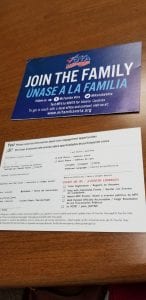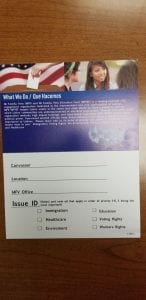Did you conduct user interviews this week? If so what insight did you gain?
We conducted interviews with Carolyn, Andre and Alex. Carolyn works with Civic Duty Rice, Andre is an AP U.S government teacher at KIP, and Alex is a Harvard bound high school senior. Through interviewing people of diverse backgrounds in terms of their involvement with the voting process, we were able to gain a wide variety of insights in to our problem. Through our interview with Andre, we learned that students feel particularly strongly about political issues that directly impact their communities. We also learned that although High School seniors think that voting is a way to exercise their independence and voice for the first time, voting is simply not a priority for them, as many of them have after-school jobs to support their families.
Through our interview with Carolyn, we learned that Rice students in do not vote primarily because they are apathetic and feel that they are not educated enough to vote. She also shared that although pledge cards are effective in obtaining contact information from potential voters, events are more effective in actually encouraging people to follow through with voting.
We learned through our conversation with Alex that there is a disparity in attitudes on voting based on students’ socioeconomic status. Students who consider themselves to be “better off” are more civically engaged, whereas minorities and students of less privileged socioeconomic backgrounds are not as engaged. He believes that this may be due to language barriers and a lack of information. He identified gun control, abortion, and climate change to be some of the primary areas that students his age care about.
Describe related projects that have been done to address your problem.
During last week’s open studio meeting, we had the opportunity to jot down our ideas from these three meeting and cluster them in bigger ideas. We learned from this activity that we have information regarding the background of our users, the primary barriers, and what is within the scope of our control for our group to solve this semester.
What do you hope to learn more about in the next couple of weeks?
Now that we have deeper insights into the more specific barriers that of age High School students face in voting and their reasons for not voting, we hope to learn more about practical measures to help overcome these barriers. We understand that this is a very nuanced issue and there is not only one solution to help alleviate the entire problem. We hope to learn more about what specific measures we can take to help solve this problem.


